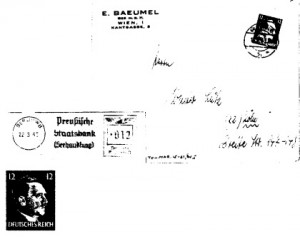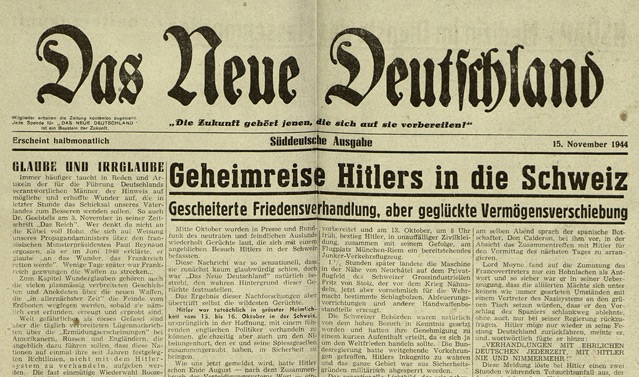
Forged envelopes and stamps, courtesy of CIA website.
Seventy years ago today, January 5, 1945, Allied bombers engaged in an unusual attack. They bombed a mail train heading for Linz, Austria. The train was derailed, and mail was scattered around the area. More bombers then arrived and dropped mail bags appearing for all the world to be genuine Reichspost bags. Inside were about 3800 letters addressed to Germans, many of whom were the families of German soldiers who had been killed in action.
The plan was known as Operation Cornflakes. The return addresses on the letters were those of German firms, and the letters outwardly appeared to be normal business correspondence. However, the envelopes contained propaganda newspapers prepared by the U.S. Office of Strategic Services (OSS), including issues of Das Neue Deutschland, an example of which is shown below.
The stamps, envelopes, and even the mail bags, had to be carefully forged to appear original to the postal workers who would handle them. While the program had no discernible effect, it was successful in that most of the propaganda letters were introduced into the German mails. After the train was bombed, German rail and postal workers dutifully picked up the scattered mail bags and sent them onward to their intended recipients.
The stamps and envelopes shown above are examples of some of the forgeries, courtesy of the CIA website. To ensure that the propaganda would blend in with the normal mail, the OSS consulted German POW’s who had worked for the post office. The details of the cancellations had to match what was in use in the cities from which the mail had purportedly originated, and there had to be some semblance of mail being in the proper train for the town for which it was intended. German POW’s provided most of this information relating to the internal workings of the German mails.
Most of the mail was successfully delivered, but in one case, a sharp-eyed German postal worker noticed that the name of the company was misspelled on the return address. This, of course, resulted in that particular batch not being delivered.
References
- Operation Cornflakes: How the Allies went postal in the secret propaganda war against the Nazis
- Operation Cornflakes at Wikipedia
- Operational History of Das Neue Deutschland
- Postal Forgeries in Two World Wars at cia.gov
Read More at Amazon
Click Here For Today’s Ripley’s Believe It Or Not Cartoon
![]()

